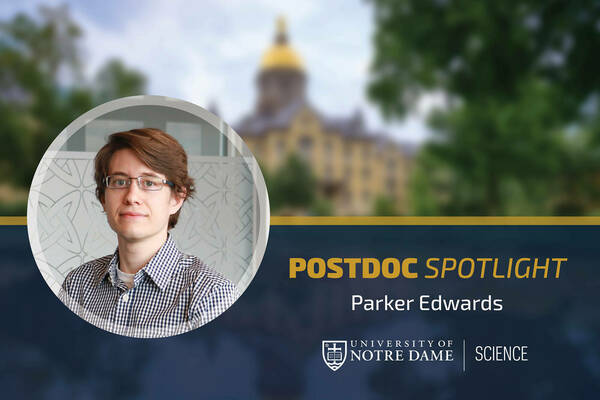“How can we turn our understanding of things that we can see…into understanding things that we can’t see?” asks Parker Edwards.
The Robert and Sara Lumpkins Postdoctoral Research Associate in the Department of Applied and Computational Mathematics and Statistics explained that this question sits at the heart of data analysis. In his second year at Notre Dame, Edwards employs topological data analysis to describe information from a variety of fields and make it more accessible to others.
Edwards’ analysis involves applying abstract theories and algorithms to concrete data sets, using the mathematical disciplines of algebraic geometry and topology. These tools allow him to then depict data sets through images and equations. Edwards has applied his research to various subjects while at Notre Dame. He collaborated with scientists at the University of California - San Francisco, University of Florida, and University of Augusta to publish a cell biology paper on actin regulation. But Edwards also works with researchers early in their careers, such as a group of undergraduate mentees with whom he is studying election data.

One of his projects involves reviewing data about gerrymandering, the manipulation of district lines to strengthen or suppress the political power of certain voting groups.
“I think that’s very civically relevant data” Edwards said. “This is something that is accessible at the undergraduate level to do analyses but still has the potential to impact larger society.”
In fact, his work with undergraduates has been one of Edwards’ favorite parts of his postdoctoral experience. As well as conducting research with students, he teaches courses such as applied linear algebra. Edwards said he enjoys gaining a new perspective on the subject by sharing it with others.
Edwards began his own undergraduate education at the University of Florida, where he received a bachelor of science in mathematics. After completing a master of science in mathematics and the foundations of computer science at the University of Oxford in England, Edwards returned to the University of Florida to earn his doctoral degree. He then started his postdoctoral work at Notre Dame in the summer of 2020.
“I’ve had good access to the types of resources that postdocs are often worried about: travel funding, computational resources, etc,” Edwards said of his experience here.
As he receives this support from Notre Dame, Edwards hopes that he can give back with his own research.
“One of my personal goals as an applied math researcher, whenever I do these data analysis projects, is to actually release software that is usable by non-experts,” Edwards explained. “A priority of mine is trying to make things that are actually accessible to at least the science community,...so that eventually things make their way out into larger society, as well.”